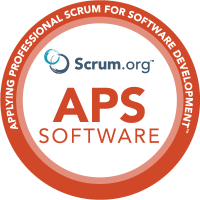
Applying Professional Scrum for Software Development
- Agile software development practices
Available as in-house training
Date and location of the in-house training to be agreed
Price: 1500 EUR + VAT / person
Available as in-house training
Date and location of the in-house training to be agreed
Price: 1500 EUR + VAT / person
Onsite training - 24h - 3 days each 8 hours (including breaks).
Online training - 24h - 4 days each 6 hours (including breaks).
Online training schedule:
The training is in English.
The training is intended for:
The Applying Professional Scrum for Software Development™ training is intended for people who have practical experience in Scrum or who already participated in an introductory training - Applying Professional Scrum™. Experience in working on complex IT solutions covering a number of business domains and requiring the cooperation of a large group of specialists divided into one or more teams is recommended.
For online training, it is required to meet technical requirements: https://valkir.pl/en/online-training/.
Each participant completing the training will receive an non-expiring voucher to attempt the Professional Scrum Developer (PSD) assessment. The assessment (in English) takes place online on Scrum.org website. In case of taking the PSD exam within 14 days and failing, the participant is entitled to a second attempt at no additional cost.
| Date | Location | Price per person | |
|---|---|---|---|
| To be agreed | To be agreed | 1500 EUR | Request quote |
What is the Applying Professional Scrum for Software Development™ training?
Applying Professional Scrum for Software Development™ is an accredited training program from Scrum.org, targeted at teams developing complex projects and creating IT products/services. Based on the experience of a group of experts from both Scrum.org and recognized world leaders in software development, a program was created to increase the efficiency of complex software development processes.
The use of such practices as e.g. pair programming, TDD, BDD, Clean Code or SOLID allows the cross-functional Developers in Scrum to provide high quality product/service increment. By introducing standards for architecture design, technical documentation and the automation of integration/implementation processes, it is possible to continuously deliver business value, minimizing the risk of error or technical debt.
The training takes the form of a workshop based on discussion and simulation of software development in Scrum, including 3 sprints, each lasting about 2 hours. The most benefits it can bring to organizations that are in the process or are planning to provide software in an Agile approach. Each sprint ends with a debrief and discussion on how to adapt the practices used to the participants' own situation. Workshops are usually performed in one of the following languages: .NET, .NET core, Java, Python or C++, and the participants choose the language together.
Who is behind this?
From the engineering side, the vast majority of practices originate from the eXtreme Programming (XP) paradigm, which was formulated by Kent Beck, which was subsequently joined by, among others Ward Cunningham and Ron Jeffries. The assumptions of this paradigm are determined by guiding values, events and specific engineering practices.
As part of Scrum.org, so-called stewards, these are PST (Professional Scrum Trainers) trainers looking after the area of engineering practices, continuous development, improvement and ensuring consistency with the possible use of these practices as complementary to the Scrum framework.
What benefits do you get?
Training enables participants to better understand how to use engineering methods and practices to effectively deliver product/service increment that meets the acceptance criteria. It contains theoretical knowledge and practical methods taken from product management, business analysis, systems architecture, code quality, stakeholder management, change management and many other topics.
As a result of this training, participants from different areas of the organization will: